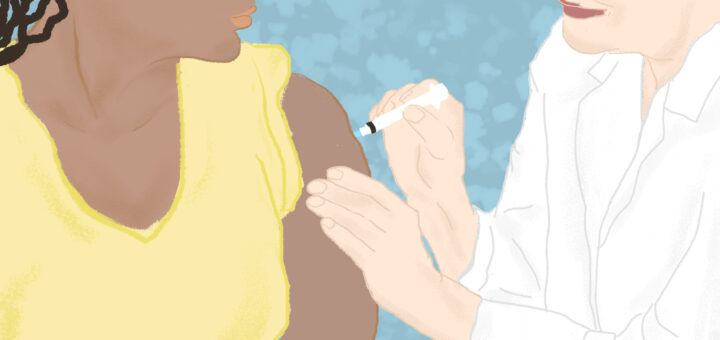When it comes to the COVID-19 vaccine, brands shouldn’t matter

by Riggs Zyrille Vergara, Publishing Editor
It has been a more than a week since the province of Alberta opened vaccination appointments to everyone over the age of 12. Since the start of their vaccination process, more than 1.8 million Albertans have received at least one dose of an approved COVID-19 vaccine, with more than 300,000 being fully vaccinated with two doses.
But even before Canada had started administering the vaccines, one question lingered in the age of the COVID-19 pandemic, which vaccine should one get?
Jeffrey Carson, a professor of medicine from Rutgers Robert Wood Johnson Medical School says that comparing COVID-19 vaccine efficacies is misleading. Carson is also the principal investigator at Rutgers for the Johnson & Johnson vaccine trial.
Since December 2020, Canada has procured four brands of COVID-19 vaccines: Pfizer, Moderna, AstraZeneca and Johnson & Johnson. According to a Yale Medicine article, both Pfizer and Moderna boast an efficacy rate of about 95% against COVID-19 after being fully immunized through two doses of each. On the other hand, AstraZeneca has an efficacy rate of 76% also after two doses. The company also said that it has 85% efficacy in preventing COVID-19 for people over the age of 65. Lastly, Johnson & Johnson has a 72% efficacy but only after one dose.
Efficacy Rate and What It Means
According to Medical News Today’s Research Editor Dr. Yella Hewings-Martin, when a vaccine is tested, it is usually done in clinical trials where two groups of people are compared. One group receives the vaccine, and one group receives a placebo.
A 95% efficacy rate of a vaccine does not mean that out of the total number of people who got the vaccine in a trial, 5% will get infected with COVID-19. But rather, it refers to the individual’s chances of getting sick when exposed to the virus. For example, a person is going to be around 95% less likely to get sick if they get Pfizer or Moderna.
But the clinical trials of each of these vaccines can look very different from each other. The conditions in which these vaccines are tested are not necessarily reflective of the real world. Vaccine efficacy only measures how well a vaccine works under the controlled conditions of clinical trials.
The participants of these clinical trials are closely monitored. They usually exclude pregnant people, those with underlying health conditions and people of certain age. This is so that the vaccine’s efficacy will have a uniform starting point when they are comparing them with the placebo.
Stronger Variants
Many factors outside of these clinical trials can affect the vaccine’s performance, such as underlying health conditions, gender, age and more. A big factor is how viruses can mutate through time, making them stronger and the vaccines less effective.
Miguel Oblea, a third year Broadcasting student from Mount Royal University, said that because Pfizer and Moderna have been around longer, he trusts those brands more.
“I think that with the new vaccines like Johnson & Johnson or AstraZeneca it’s kind of scary to get them because they’re newer and I have heard more incidents with them. I remember one person died from a blood clot from getting AstraZeneca. So, I would for sure prefer Pfizer or Moderna.” Oblea added.
This is where the factors of stronger variants and mutations become apparent. It’s important to know that Pfizer and Moderna were tested in early 2020 when the COVID-19 virus did not have much stronger variants, and both AstraZeneca and Johnson & Johnson were tested against the said stronger variants. This might be one of the reasons why the latter two mentioned vaccines have a lower efficacy rate.
Dr. Shannon McDonald, the Acting Chief Medical Officer of First Nations Health Authority, said in her message that “The best vaccine for you is the one available to you right now.”
McDonald makes it clear that there aren’t enough studies to prove that one vaccine is overall better than another one. She also emphasizes that delaying one’s dose in the hopes of getting a “better” vaccine only leaves them more vulnerable to the virus.
“So, while no vaccines provide 100 per cent protection, all vaccines provide a better level of protection against COVID-19 than not getting a vaccine at all,” McDonald added.
The most important thing to know is that all vaccines currently available to Canada are all known to effectively prevent severe illness and death. Not one person who received the vaccine in any of these clinical trials needed to be hospitalized or died from COVID-19.
Hospital Shortage
As of May 17, the head of Alberta Health Services Dr. Verna Yiu said that doctors and nurses across the province are treating about 240 people in intensive care units (ICU) – the highest number of ICU patients Alberta has ever faced.
About three-quarters of the patients are positive with COVID-19 and 220 of them are on ventilators. The total number of people being treated because of the virus has reached 678.
“That is easily the most ICU patients that we have ever seen in our health-care system and definitely higher than what we have seen in waves one and two,” Yiu added.
Although this is the case, about 400 ICU beds can be opened by using unstaffed beds and repurposing isolation rooms or operating recovery rooms. But the problem, according to Yiu is providing staff for these spaces. Yiu also pointed out that more people are needing ICU care, even younger adults with fewer underlying problems.
Some Alberta hospitals had to be closed for long-hour periods due to a shortage of available doctors this past month. The Rocky Mountain House Health Centre’s emergency department was closed for 16 hours. Fairview Health Complex’s emergency department also had to close for 12 hours and the Elk Point Healthcare Centre emergency closed for 24 hours.
The more people delay getting their vaccine shot, the more there are chances of them getting sent to the hospital to be treated. With this shortage already in place in the province, it cannot afford to be overwhelmed much more. There is only so much the AHS can do, and they are doing the best that they can.
Herd Immunity
McDonald also emphasizes that getting the vaccine will prevent variants of the COVID-19 virus from further developing and becoming a stronger threat. She points out that more people getting the vaccine means a closer step towards herd immunity. This type of immunity might not immediately get rid of the vaccine, but it protects the most vulnerable and high-risk people from being infected with the virus.
The Best Vaccine
Even with more people being able to get the vaccine in Alberta, the hesitancy towards getting the best vaccine remains. But as McDonald’s statement had said, which is worth repeating, “The best vaccine for you is the one available to you right now.”
At this point of the pandemic, the best move is to protect and arm ourselves through the most accessible ways we can. This includes wearing a mask, washing your hands and of course, getting the vaccine.
But much like the virus, we need to take advantage of every opportunity we have. This means getting the most available vaccine to you. Due to the overflowing number of patients in ICU, the increasing number of cases and alarming number of deaths, the focus should not be on which vaccine is the best, but on which vaccine will help you protect yourself, your family and your community in the quickest and most accessible way possible. And that could be any of these available vaccines that Canada has to offer.




